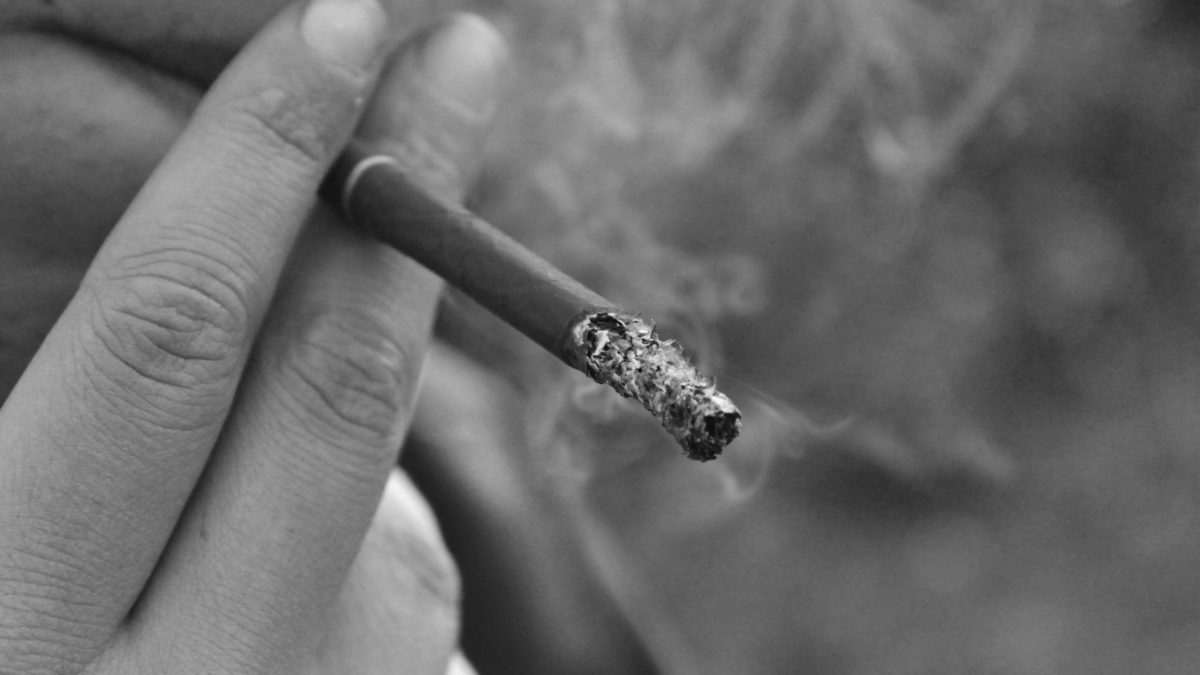 Supplied - Sophie Riches
Supplied - Sophie RichesThe University of Alberta should ban smoking.
Recently, many universities have been banning smoking on their campuses. In 2003, Dalhousie became the first Canadian university to approve a ban.. The ban aims to make a cleaner and healthier environment for students. The majority of students at these campuses support the ban, but there is some resistance.
At the U of A, smoking is not currently banned, but it is restricted inside all buildings and residences. The effectiveness of this system can be called into question in a number of ways. It may be time to take a firmer stand on the issue.
Of course, some people, especially smokers, would be against a ban like this. They would say that smoking is their choice and that by banning it, they are not allowed to do as they please. In my opinion, this is a pretty weak reason for not supporting the ban. Students who smoke would still be free to smoke off campus and by doing so away from campus, they would be contributing to a cleaner space at the university. To add to that, I feel that campus is a place that should stimulate learning and positivity. A ban on smoking would mean taking a big step in this direction.
Speaking as a student who lives in university residence (and a non-smoker), it would be great to have smoking banned on campus. The current rule for campus residences prohibits smoking indoors and to smoke you must be at least five feet away from the doorway. In frigid winters, I have seen students smoking while still standing in the door with it just propped open, or not bothering to go outside at all. Some just decide to ignore the rules and smoke inside their residence. The smell diffuses everywhere and students hold their breath as they walk through a cloud of hazy smoke. The RAs usually can’t pinpoint where it’s coming from since it spreads and the students responsible never listen to the warning email sent out. Students found smoking in residence face a meeting with the residence coordinator and possible eviction.
There are many students on campus suffering from asthma, migraines, etc. the effects of second hand smoke make it much harder for these students to deal with their conditions. And it isn’t helping the rest of us either. Banning smoking to prevent second hand smoke is a motivating reason, but it goes further than that. The sight of cigarette butts littering the ground are a constant reminder that some people actively choose to put dozens of toxic and poisonous chemicals into their bodies. It gives off a slightly depressing vibe and takes away from the image of campus being a positive and clean space.
By banning smoking, the university wouldn’t be unwelcoming to a subset of students because it isn’t about punishing students that smoke. It’s about changing the culture and atmosphere (figuratively and literally) on campus. Recently, the University of Alberta has seen a larger presence of sustainability and mental health services. A complete ban on smoking would fit right in with the image that is promoted by these other initiatives. The ban would be making a statement about what kind of place our campus is as a community. It would promote a healthier and cleaner space for everyone.





To the writer – it’s unfortunate that you’ve had some experiences with uncurteous smokers. However, banning smoking campus-wide will not solve the deeper issue that some people are just assholes. It is possible to smoke politely, and problematically, the people who do aren’t as visible as the ones who do it without consideration for others.
Not being a smoker you wouldn’t know, but smoking can be a very enjoyable, visceral experience, and is also helpful for focus. It got me through a pile of papers while I was doing my degree at the U of A. I can’t help but think that my work was improved by it.
But, I’m not deluded. The smoking ban on campus is coming. If not this year, maybe next, or the next. And smokers will have to prepare themselves for the fact that the change won’t come with good reason. Healthier and cleaner spaces for everyone, no second hand smoke, so-called concern for the health of smokers. The classic hand of the butthurt anti-smoking brigade. Let’s be honest. The weight of inertia will be what makes the change, not a sober look at the reality of the situation.
No, smoking bans should be rejected. Smoking bans are oppressive and not about health since there is essentially no risk from second hand smoke (especially outdoors). It’s time to stop the persecution of smokers.
Even smoking five feet from a door means that other individuals have to walk through second hand smoke in a significant majority of cases. If you can smell the smoke then you are inhaling that smoke in too – so it is about health. It’s oppressive that non smokers have to be continually subjected to second hand smoke even outdoors if you want to reverse your logic. It’s not a private experience.
You have been brainwashed. Smelling smoke does not mean breathing it. Beyond that the data regarding the risk of second hand smoke don’t support your view.
this 2016 study (meta analysis) disputing the risks of second hand smoke: Peter N Lee, John S Fry, Barbara A Forey, Jan S Hamling, Alison J Thornton, Environmental tobacco smoke exposure and lung cancer: A systematic review. World J Meta-Anal. Apr 26, 2016; 4(2): 10-43, doi: 10.13105/wjma.v4.i2.10 CONCLUSION: Most, if not all, of the ETS/lung cancer association can be explained by confounding adjustment and misclassification correction. Any causal relationship is not convincingly demonstrated.
Another study (2010) found: “ETS exposure was not found to significantly increase risk among never smokers in this study” and “It is now clear that the molecular pathogenesis of lung cancer in smokers and non-smokers is different.” Darren R Brenner, Rayjean J Hung, Ming-Sound Tsao, Frances A Shepherd, Michael R Johnston, Steven Narod, Warren Rubenstein and John R McLaughlin. Lung cancer risk in never-smokers: a population-based case-control study of epidemiologic risk factors. BMC Cancer, 2010,10:285 DOI: 10.1186/1471-2407-10-285
Then there is a large study disputing the link: Boffetta, et al: Multicenter Case-Control Study of Exposure to Environmental Tobacco Smoke and Lung Cancer in Europe, Journal of the National Cancer Institute, Vol. 90, No. 19, October 7, 1998: “public indoor settings did not represent an important source of ETS exposure.” (This case-control study used data from the IARC. The period of enrollment of case and control subjects was from 1988 to 1994–16 years; IARC=International Agency for Research on Cancer.}
In addition, this large study looked at 38 years worth of data: Enstrom, JE and Kabat, GC. Environmental tobacco smoke and tobacco related mortality in a prospective study of Californians, 1960-98 BMJ 2003; 326:1057.This study found “No significant associations were found for current or former exposure to environmental tobacco smoke before or after adjusting for seven confounders and before or after excluding participants with pre-existing disease.” (This prospective study used American Cancer Society dataset.)